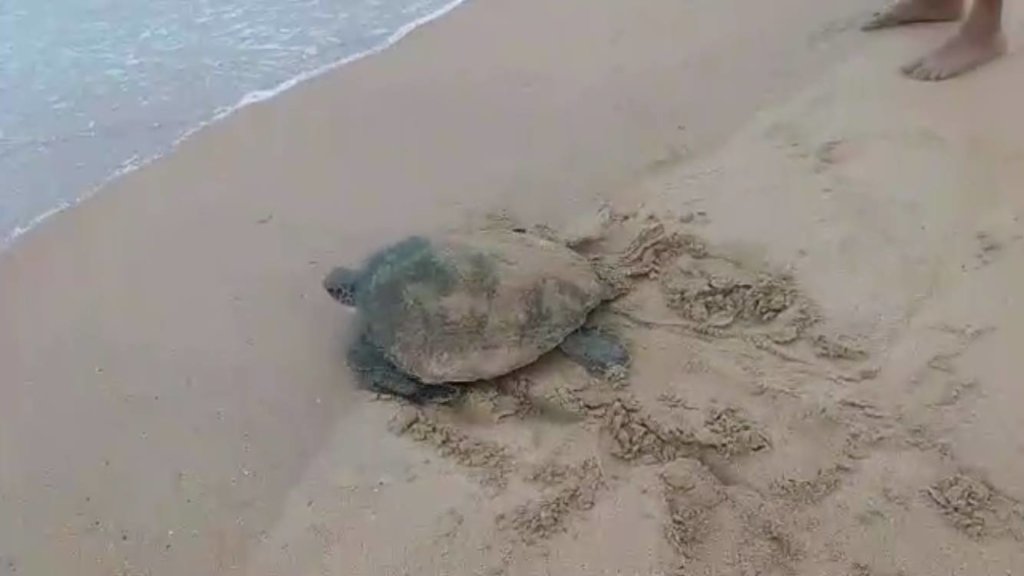By Snehaa Sundaram | Project Leader
Hello Supporter,
Wildlife Trust of India wishes you all a very Happy Easter. This Easter, we bring to you, not the bunny, but an update from his aquatic friends. We thank you all for being our constant support.
Indian fisheries and aquaculture are an important source of livelihood and nutrition for communities residing along the coastline of India. The Indian Fishery industry is ranked #3 globally and more than 50 different types of fish and shellfish products, accounting to 0.6 million tonnes are known to be exported to 75 countries. To match the growing demand, several fishing trawlers and boats scour the Indian waters to get hold off sizeable fish stock. Trawlers especially are considered a boon for the economy but, it has a flipside to it. While scouting the waters for fish, trawler nets trap thousands of unintended juvenile fish and other marine species, collectively called ‘bycatch’. Studies have established almost 60% of total biomass brought in by trawlers are considered redundant as they constitute juvenile catch and bring in very little revenue. Often even marine megafauna like whale sharks, dolphins, turtles etc. which are protected under India’s Wildlife Protection Act (WPA) 1972 also get trapped in such nets. The lack of knowledge amongst the fisher folk leads to the species death and illegal trade of their accidental catch. Such recurring loss of juvenile fish and apex predators shall eventually lead to an imbalance in the food chain and serious damage to our marine biodiversity.
One such key species is the Olive ridley turtle (Lepidochelys olivacea) the smallest and most common amongst sea turtles found across Indian waters. Though found in abundance their numbers have been rapidly declining and are today categorized ‘Vulnerable’ as per the IUCN Red list and Schedule I species under the WPA,1972. Mainly at the time of mating or mass nesting season which is otherwise called Arribada, (where females congregate together on the same beach to lay eggs) Olive ridley turtles face danger during their onward journey to the shore. Several accidental deaths by entanglement in trawl nets and gill nets are observed during this period. To address this issue of marine megafauna like Turtles and Whale sharks getting trapped as bycatch, Wildlife Trust of India has initiated a project with the fishing community of Sindhudurg and Ratnagiri districts of Maharashtra where maximum encounters have been lately recorded. WTI along with the concerned stakeholders are trying to ensure timely release of any trapped species and introduction of ex-gratia schemes to compensate damaged nets.
Last month, a fisherman from the Sindhudurg fishing community network encountered an Olive ridley turtle trapped in his gill net. He carefully removed the turtle out of the net and released it back into the waters. Similar rescue operations in November 2018, where a 30ft long whale shark was released by a Palghar fishermen (by cutting the net) has given much recognition to release trapped protected species and the need for ex-gratia schemes in the state. Since then the fishermen have been enthusiastically documenting rescue operations and providing this as evidence to the FD, to get eligible for compensation of their damaged nets. We would like to appreciate this commendable effort of artisanal fisherman to voluntarily release protected species back into the wild and hope to motivate them more in this noble act with your kind support.
Project reports on GlobalGiving are posted directly to globalgiving.org by Project Leaders as they are completed, generally every 3-4 months. To protect the integrity of these documents, GlobalGiving does not alter them; therefore you may find some language or formatting issues.
If you donate to this project or have donated to this project, you can receive an email when this project posts a report. You can also subscribe for reports without donating.
Support this important cause by creating a personalized fundraising page.
Start a Fundraiser